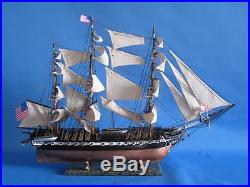
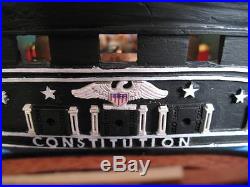
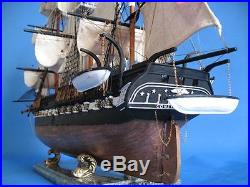
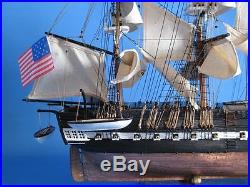
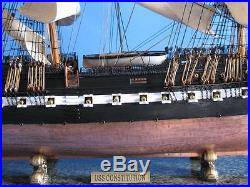
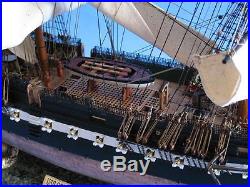
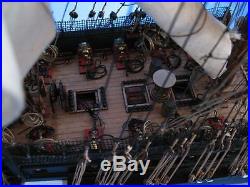
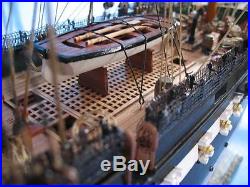
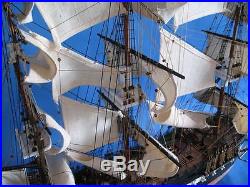
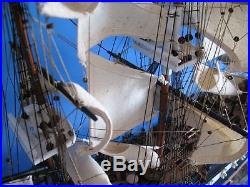
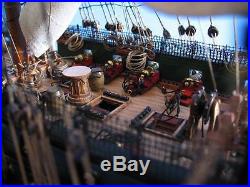

BC Fishing World Welcomes You. Displayed as the commanding centerpiece of any office, den or boardroom, Old Ironsides will inspire awe with her exquisite design and a victorious determination with her historic patriotism. 50″ Long x 15″ Wide x 34 High (1:49 scale). Built from scratch over hundreds of hours by master artisans. High quality woods include cherry, birch, maple and rosewood. Individual wooden planks used in hull construction. Meticulous painting accurately matches the real USS Constitution. Accurate beakhead design and scrollwork. Netting on bow and along gunwale to prevent boarding. Handcrafted rosewood eagle on the stern. Increased detail of deck features, cannon carriages, painting and other features. Most complex rigging of any model with hundreds of blocks and deadeyes. Four anchors weigh aside the bow. Cannon carriages tied-down to deck to reduce recoil. Other Amazing Details , including. 23 masterfully stitched, heavy canvas sails hold shape and do not wrinkle. Taut rigging with varied thread gauge and color. Planked deck with nail holes. Shield on the bow. Solid brass cannons and metal anchors. Rudder chains, cannonball racks. Additional deck details such as cannon balls, barrels, etc. Wooden display base features four arched dolphins. Pictured with marble base (FREE). Extensive research of original plans, historical drawings and paintings as well as actual photographs ensures the highest possible accuracy. TO REATTACH NO TOOLS OR GLUE IS NEED AND IT TAKES 3 MINUTES. Check out my other items. At the end of the American Revolution, in 1783, the United States began to send ships across the globe in an effort to bolster its fledgling economy. By 1785 the Continental Navy of the Revolution had been dissolved, leading to these ships sailing unprotected in international waters, a move which eventually lead to the creation of the USS Constitution. During this time, off of the coast of Northern Africa, merchant ships were in need of naval protection leading Congress to authorize a new navy in 1794. As part of this “new navy” six frigates were ordered, the last remaining of which is the legendary USS Constitution. On November 1, 1794 the Constitution was laid down, and she was launched on October 21, 1797. Emerging as a ferocious, heavily armed vessel, the USS Constitution was on her way to becoming the legend she is today. Designed to be the perfect confluence of strength, speed, and firepower, master shipbuilder Joshua Humphreys set out to create ships that could compete with the massive fleets of existing European naval powers. At 204 feet long, with a 43 foot beam and three masts each towering over 170 feet, the 44-gun, 1576-ton frigate could cruise at a clipping 13 knots (15 mph). Embarking on July 22, 1798, sailing from Boston to the Caribbean, the Constitution carried 450 officers and crew on her magnificent maiden voyage. Before long, the Constitution and her crew would be patrolling American waters during the Quasi French War, and would soon be sailing to the Mediterranean coast of Libya, where she would aid in the blockade and attack of Tripoli Harbor. In 1801 Yusuf Karamanli of Tripoli made demands for increased tribute pay from the northern Barbary States, increasing the danger for American merchant ships sailing throughout the Mediterranean; two years later Thomas Jefferson ordered the Constitution to join the blockade in Tripoli. Having been recommissioned on May 13, 1803, and after repairs in which Paul Revere provided new copper for her hull, the Constitution joined the third blockade of Tripoli Harbor under the command of Captain Edward Preble. Emerging victorious, the Constitution made way for Malta for repairs before returning to Tripoli on April 5, 1805, joining more than 17 other American vessels and aiding in the negotiation of a peace treaty. Following her heroic efforts during the Barbary War, the Constitution enjoyed the next two years sailing the Mediterranean as the flagship of the Mediterranean Squadron. Returning to the United States victorious, the Constitution underwent repairs from 1907 to 1909, readying her to perform as the Flagship of the “Northern division of ships for the protection of the American coast;” positioning her to become a key element of the war that was soon to follow. After coming under command of Captain Isaac Hull, and sailing along the coasts of France, England, and Holland, the Constitution would soon enter into the War of 1812. Though rated as a 44-gun frigate, as war was declared she was refit with 30 24-pound canons, 15 to a side; 22 32-pound canons, 11 to a side; and 4 chase guns, two each at her stern and bow. Properly repaired, and laden with her new firepower, the USS Constitution would soon make history, and earn her renowned nickname Old Ironsides. After sailing to France on August 5, 1811, Captain Hull maintained daily sailing and gun drills to keep his crew prepared, though by February of 1812 war had yet to erupt, forcing the captain to return to America. On June 18th of that year war was officially declared and the Constitution set off into the Atlantic yet again. After taking out the Guerriere’s mizzenmast along with multiple crew, the Guerriere sailed errantly into the Constitution, locking the two ships in a battle to the death. Victorious in battle, the Constitution was also granted her nickname after an exuberant American sailor reportedly shouted huzzah, her sides are made of iron! – Old Ironsides was born. In a brief battle with the HMS Java the Constitution’s helm was destroyed, prompting Captain Bainbridge to order his crew to steer with the tiller. Though without much control, the Constitution was able to affect some quick repairs at sea before returning to the battle and forcing the surrender of the Java. Two years later, following her victory over the HMS Cyane and HMS Levant, the Constitution was again placed in dry dock for repairs as war with Britain subsided. Over the course of the next 20 years, Old Ironsides would travel between the Mediterranean, where she acted as the Mediterranean Squadron Flagship, and dry docking for repairs, before returning to Boston for a significant and much needed overhaul. Two days later Oliver Wendell Holmes published his poem “Old Ironsides, ” prompting a severe public outcry, which eventually lead to the approval of the repair costs. Emerging once again from dry dock, the Constitution was in better shape than ever, ready to sail in a more diplomatic capacity. Making way on May 29, 1844, the Constitution would begin a cruise that would take her around the world, astonishingly sailing more than 52,000 miles. Carrying Americas Ambassador to Brazil, the Constitution reached Rio de Janeiro on August 2 before again setting sail on September 8. Arriving on January 1, 1845 in the latter, the majority of the Constitution’s crew had fallen ill with dysentery and fever, prompting the captain to make an emergency cruise to Singapore. Surprisingly, after arriving on February 8, Commodore Henry Ducie Chads of the HMS Cambrian offered his services and medical supplies to the ailing crew of the Constitution. Having been a Lieutenant aboard the HMS Java thirty years prior, when the Constitution had defeated her off the coast of Brazil, the Commodores act appeared to firm solidarity once again between British and American sailors. Continuing on from Singapore Old Ironsides made her way to Turon, known today as Da Nang, Vietnam, and from here onto Canton, China for a six week diplomatic mission. Arriving in the Hawaiian Islands on November 16, 1845, Captain Percival was greeted with news that the Constitution was needed in Mexico as the United States expected the outbreak of war. Informed by Commodore John D. Sloat that the United States was preparing for war following the annexation of Texas, the Constitution was reprovisioned for a six month tour and departed across the Pacific. Arriving in Mazatlan, Mexico on January 13, 1846, the crew of the Constitution would wait, docked for three uneventful months, before ordered to return to home port. Leaving on April 22, Captain Percival was later informed that war had broken out on May 13, less than a month after the Constitutions departure. Ending her around the world trip in three years, the Constitution was sent to Africa throughout the mid 1850s to act as the African Squadron Flagship, the last military duty the legendary vessel would see as an active combatant. Until September 1871 the Constitution served in this training capacity, transitioning gracefully into the second phase of her storied career. Following the conclusion of the war, Old Ironsides was once again overhauled, this time to participate in the 1878 Paris Exposition. With such a long and legendary career, the USS Constitution remains as amazing as ever, having been restored to her original design specifications in 1992. On July 21, 1997 she sailed under her own power for the first time in 116 years, and beginning in 2007 she underwent restorative action to return her to the classic design she boasted during the War of 1812. With her gleaming copper hull restored, her historic paintjob redone, and her wood beams replaced to make her seaworthy, the USS Constitution is an enduring icon of American history. At more than 200 years old she is the oldest commissioned naval vessel in the world, and captained by Commander Matt Bonner, she continues to act in a historical and educational capacity. With a crew of 60 active duty Navy personnel she rests at Pier 1 of the former Charlestown Navy Yard, and remains open to the public with her fabulous tours. Serving with honor and distinction, the USS Constitution, Old Ironsides herself, remains docked proudly today just as she was more than 200 years ago. The item “USS Constitution Limited Tall Model Ship 50″ is in sale since Thursday, November 24, 2016. This item is in the category “Toys & Hobbies\Models & Kits\Boats, Ships\Wooden”. The seller is “bcfishingworld” and is located in Alhambra, CA. This item can be shipped to United States.
- Year: 2015
- Country/Region of Manufacture: United States
- Brand: Handcrafted Model Ships
- MPN: SKU#: B0801C
